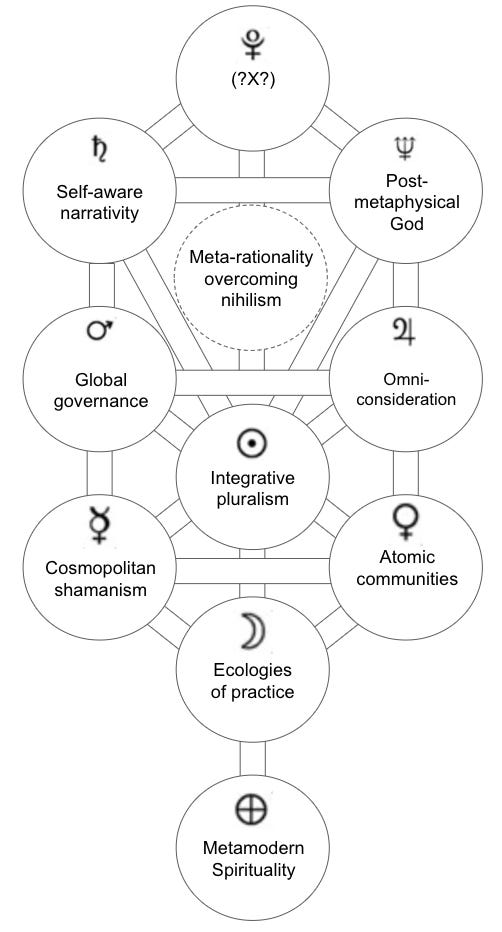RELIGION IS THE DEFAULT HISTORICAL HUMAN APPROACH for integrating larger scales of reality. It is also a general strategy for creating shared meaning, mobilization & cultural depth. However, the threats of dogmatism, superstition and xenophobia obviously loom large.
Among people engaged in attempts to promote a regenerative, transmodern civilization that cultivates multidimensional well-being and evades existential catastrophes, opinion is strongly divided on the topic of religiousness.
For some of us, it seems that our communities are always swaying dangerously close to the metaphysical bog of religion. The “-ism" in metamodernism already looks like a very bad sign. Even leading-edge thought networks are menaced by mass gullibility, pre-rational thinking and social predators posing as spiritual authorities.
Yet others in our overlapping communities feel that
something like religion is necessary in order to cultivate sacred regenerative living, to access the transcendental possibilities of individuals and to join together intersubjectively in meaningful movements that prophetically challenge the existing entrenched modes of modern and postmodern society.
(And a lot of this, of course, depends on precisely how we define the word religion.)
Even though there is disagreement about whether we are too religious or not religious enough, there is a lot of convergence in the speculations of our various quasi-religious thinkers. A general landscape and tone is forming about what kinds of religion might be viable in the Age of Metacrisis.
There is significant resonance between things like
Vervaeke's religion-that-is-not-a-religion, Dempsey's Emergentism, Henqrique's 4 L's & the Tree of Knowledge, Landry's Immanent Metaphysics, Azarian's re-enchantment of the sciences, the Syntheism of Bard and Soderqvist, the nondualist Integral Postmetaphysical Spirituality of Alderman & Pascal, etc. Strong shared themes and general contours exist. There is rough agreement about a few things we definitely would need a religion to do -- and certain things we would have to make sure that it does not do. It may be time to start highlighting and coordinating these shared features.
That's what the Octopus is doing.
Headless God is the first part of a new series on Metamodern Religion from The Octopus (
Octopusyarn Substack). He is using a modified version of the ancient 10 Sephiroth model of the Kabbalah to elicit a schematic for what he calls “metamodern religion." Here's what the Octopus says:
>
In order to solve the most pressing crises of our times, we need a new global religion, This Metamodern Religion needs to: include the relevant aspects of traditional religion without falling into any of its pitfalls; integrate them with science, culture, and art; strike a balance between providing an overarching narrative and a base set of rules to achieve coherence, while allowing for different cultural manifestations; become a lived reality that facilitates personal meaning and development.
The Octopus is not proposing a particular new religion but rather he is gathering and correlating the work of eclectic, leading-edge thinkers associated broadly with the liminal, metamodern, integrative and transdisciplinary movements -- attempting to place them together in a shared schematic that highlights the attitudinal, metatheoretical and social necessities.
Keep tracking
The Octopus for his next installments but, more importantly, reach out to him via his Substack. He is actively looking for engagement, critique and suggestions.

